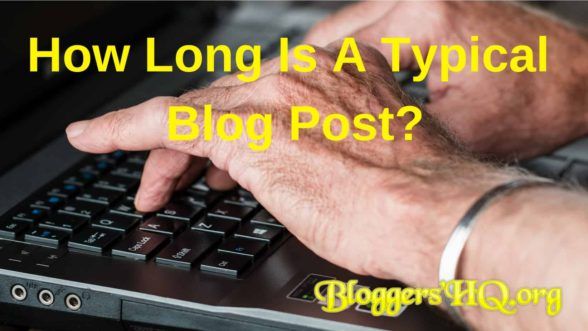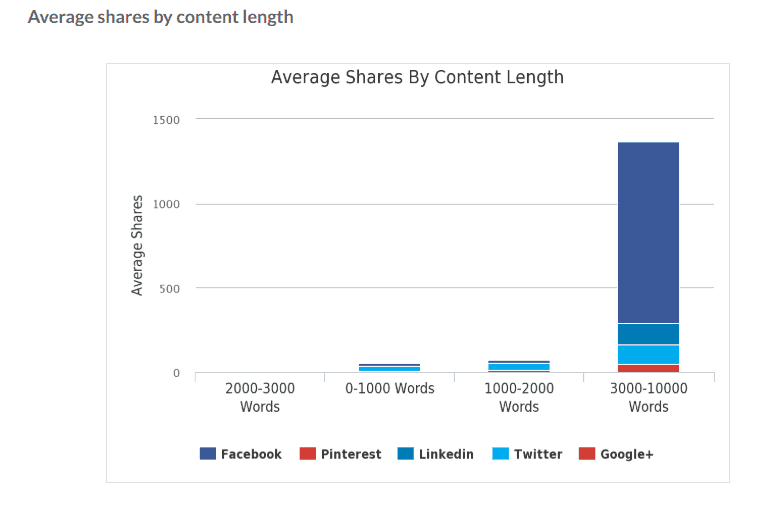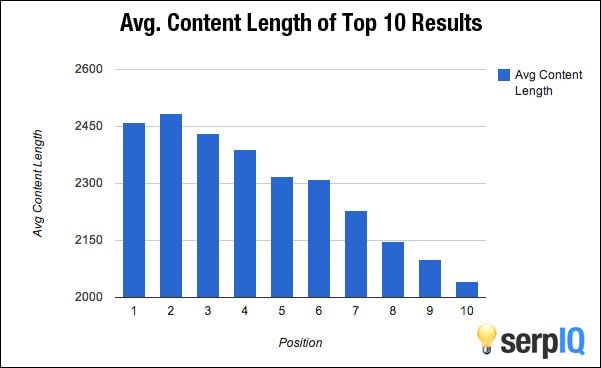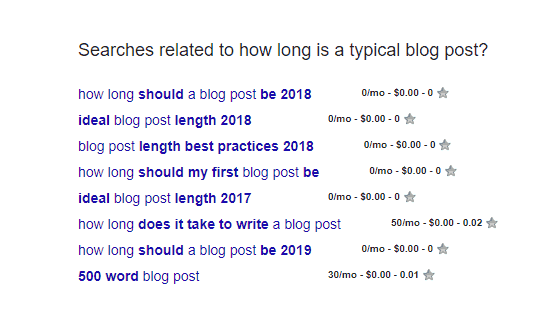How Long Is A Typical Blog Post? + 7 Actionable SEO Tips!

If you are Scratching your head and wondering How Long Is A Typical Blog Post or How Long Should A Blog Post Be in order to rank on page one of google you have found the right article!.
In this article I discuss the Ideal Blog Post Length that you should be aiming for to get your site and your articles riding high in the SERPS and getting a bunch of beautiful and free organic search engine traffic.
And that is exactly what we all want - and a whole bunch of social shares to boot!.
"How Long Is A Typical Blog Post?" #WordPress #BloggingTips #SEO
There is one thing I like to keep crystal clear - the length of your content is only one factor that search engines take into consideration when it comes to ranking, and just because you wrote an article that was longer than other that are ranking high it is by no means a guarantee that you will rank higher.
There are some 200+ known ranking signals taken into consideration when it comes to sorting out who and what should rank where, and according to research there does seem to a correlation between Blog Post Length and its position in the rankings.
There is also data relating the number of shares and length of content!.
If you are an avid blogger or a highly motivated newbie - keep reading to find out what the ideal blog post length is!.
The very answer might surprise you!
Thrive Leads Shortcode could not be rendered, please check it in Thrive Leads Section!
More...
How Long Is A Typical Blog Post? - It's No Just About Word Count!
When it comes to the ideal blog post length it really is not a matter of word count it is a matter of quality. Creating an article of what ever length say 10,000+ words is not going to rank if the quality is absolute trash.
Like wise can be said for shorter content Because you wrote greater shorter and sharper to the point content it is not necessarily going to rank if the quality of the content sucks!.
From here in, I will happily presume that you are good writer and (I know you are!) And your content quality is good or at least as good as anyone else out there in your niche.
BOX OUT: The Absolute Essentials That You Will Need For Starting A Blog Today!
- Join My 7 Day Free Course and discover all that you need to know to build a successful blog!
- Sign up for A Free Account With They Guy's that taught me! And Get Full Success Coaching And Assistance from me!.
- If you plan on building an email list And Properly Owning Your Traffic, start a free trial of ConvertKit
How Long Should A Blog Post Be To Get A Ton Of Social Shares?
This is where things start to get interesting in terms of how long blog post should be. There is a fair bit of human psychology going on here as well as word count.
As human and social animals we like to share things of quality (there's that word again!) be it inviting a friend round for a fine wine or a fancy whisky or out to a plush restaurant for dinner, we in general love to share items of quality.
...and online in the digital world we are no different!.
Longer articles are seen and perceived as being of greater quality and mostly they are due covering a topic in greater depth.
Thus,
They attract more social shares.
A study by the SEO giant MOZ Here Produced some very interesting results.

If you are looking at the results there it is impossible to notice that content greater then 3000 words attracts way more social shares.
This graph is indicating shorter content hits a sweet spot hovering around the 2,000 word mark.
Also, longer content is perfect for skimming over and scanning, many of which readers, who do have a genuine interest in the article will bookmark for later and that is a great user signal for search engines - return visitors!.
On that aspect of SEO, with longer articles on site time tends to be much longer when compared to shorter articles. Again, another good user experience signal.
Thrive Leads Shortcode could not be rendered, please check it in Thrive Leads Section!
This information is something that you can marry well with the findings of Serpiq indicating that to rank on page 1 of google you really are aiming for something in the 2,500 word region.
This is research that debunks the myth of shorter content being better and those just saying randomly and using the rather nice round number "1,000 words is how long a blog post should be".
Like it or lump it 1,000 words is not enough to cut it these days.
Sure,
There was a time when 1,000 words was enough and would even land you top spot. And yes, it might still do so, but for less competitive keywords and is a more "one off" thing than what has been proven by research over thousands of keywords across a variety of industries.

To rank high in search engines you need to write articles in the region of 2,500 words
What Is The Ideal Blog Post Length?
It is a very general and accepted norm in the blogging world that longer articles are better than shorter articles.
Thus,
The ideal blog post length for your "everyday" and weekly articles should be in the 2,300 to 2500 word range in order for you to get the maximum possibility of ranking high on page one of search engines and to maximize the potential of social shares and traffic.
Each of my general posts I write I aim for 2,500 words.
Also,
Once monthly as a blogger that is attending well to your audiences needs you should try at least once per month to create a much longer article of 3,000 to 10,000 words, simply to establish your authority and maintain the attention of your audience and cover at least one topic in depth on a regular basis.
I recommend And Suggest that you bookmark this guide and article (Ctrl +D) so that you can come back to it and start reading where you left off and not miss out on any of the awesome tips and techniques
Better still, take a few seconds to sign up for my 7 day 100% Free E-course on blogging and you will get absolutely everything you need to succeed delivered via email over the next week!
Getting Your Content To Rank
It is of course one thing to create quality content, it is another to get it to rank in search engines. From now on, I shall discuss some techniques you can deploy and apply to help your content to rank well.
Once you have decided on your target keyword and done your keyword research, and know how many sites are competing to rank for that very same keyword I highly advise you to check out what is ranking in the top 5 positions and determine what is the search query intent behind the keyword.
Is the intent navigational, informational, or transactional.
- Navigational: This is a genuine navigation based keyword, the user is searching for a particular website i.e "YouTube" is the search query - the user is searching for..YouTube website or "Contact Us" the user, when on a given website is looking for the contact page.
- Informational: This type of search query the user is looking for information about something, example "How Long Is A Typical Blog Post?" is an example of this. It is not a navigational nor transactional based keyword.
- Transactional: These are your buyer intent keywords and will include such terms like where to buy, for sale, exact product names and or models, review type keywords. The user is seeking to make a purchase.
And what is google ranking for that keyword phrase? Navigational, Transactional or Informational based article.
When you do you this you will be matching keyword with its intent and what type of content google is ranking for that keyword.
Do this and you will certainly get more traffic for your blog than just leaving it down to guess work!.
Because You Know You Can Make More Money With A Blog Than Your Regular Job!. The Question Is: Are You Going To Step Up And Take The Money?!?
Analyse The Competition And Blog Posts Length
When you have that keyword, and know what the search query intent is that google is ranking for that particular keyword you can go a step further.
And this is a kick ass ninja technique...
Check out the top results and their domain authority using website SEO checker. If the DA is low, 30 or under, rest assured that those results are beatable even if your site is new. If the DA is on the very high end for all results then you might want to reconsider your keyword selection.
Do remember it is very likely that your DA will improve with time as you continue creating great content and grow your site.
Also, check out the readability, scores, site speed and content length for what is getting ranked on page one of google for your target keyword. A really cool tool that can do all this in on fell swoop is SEO Rambler.
WARNING!
Taking My FREE 7 Day Blogging Course May Very Well
Result In You Winning Back Your Financial Freedom,
Causing Tremendous Personal Satisfaction & Living
Out The Life Of Your Dreams.
Make Use Of LSI Keywords
LSI Keywords are simply keywords that are semantically related or similar to your target keyword. LSI, simply means latent semantic indexing. By using keywords like this in your article you are helping the search engines to determine what your article is about, also, you will in all probability end up ranking for these keywords also!.
Your LSI keywords you ought to target 2 to 4 in your article, in this very article I have targeted How Long Should A Blog Post Be and Ideal Blog Post Length as my targeted LSI keywords.
If you need to, go re-read and check out the usage of those keywords in this article.
Like your regular keyword, treat your LSI in the same and similar manner.

Both Targeted and LSI keywords will help you to rank your blog posts, no matter how long they are.
Don't keyword stuff, use your keywords naturally and where appropriate. Your targeted keyword have it in your URL, title, and at least 1 H2 heading. You should also have your keyword in your opening sentence, ideally first 160 characters and at the end of your article.
Also place it appropriately throughout your article - again no stuffing this is something that is a big no-no. Keyword density is very much a thing of the past.
Your LSI Keywords have them in your second paragraph, if you can work them in naturally that is and at least one H2 heading. Like your main keyword, mention them within your content in a completely natural manner.
Remember these are to help google to determine what your content is about and also provide you with something to write about in your article in most cases.
Images...Your images, use both your LSI and main keywords in the Alt Tag and description as well as the image title.
Thrive Leads Shortcode could not be rendered, please check it in Thrive Leads Section!
Finding Your LSI Keywords
finding your related keywords is absolutely simple. I use LSIGraph, which is a premium tool and by no means you are obliged to use.
In fact, google themselves help you to find related keywords!. simply google your keyword and scroll to the bottom of the page. All the keywords mentioned there are LSI Keywords.

All of these are LSI keyword related to "How long Is A Typical Blog Post?"
Internally Link From Older Content To Your New Content
In your content link out to at least one authority article that is ranking well for your target keyword using your keyword phrase as the anchor text. This is giving search engines the signal that this is what your article is about.
Also, if you can, link internally from ANOTHER older article on your site to that article that you are creating and like wise like internally to from the new article that you are currently writing to older article you have written.
This is called forward and backward internally linking. Linking from older content to newer content and newer content to older content. A very good technique and good SEO housekeeping.
Warning! - F.O.M.O ALERT!
Fear Of Missing Out On Taking My FREE 7 Day Blogging Course May Lead To You A Melancholic State Of Infinite Sadness Due To Missing Out On The Opportunity To Change Your Life For Ever And For The Better, Leaving You With The Eternal State Of Mind Thinking "What If I Actually Built That Darn Blog!"
Use A YouTube Video
It is a well known fact that Google owns YouTube, and YouTube provides you with good ranking metrics as having video on your site helps to maintain reader attention and keep them on page longer.
In short, provides a good user experience, something that is a large part of googles ranking algorithm.
Talking of which....
How long Is A Typical Blog Post? - The Conclusion
Now that you have learned how long a typical blog post should be the question is what are you going to do with this information?
Are you going to use it in your blogging arsenal and help you to rank better and make more rankable content and become a better blogger?
Or are you going to use this information to have a real good thought about starting your own blog?
I do suggest that you give serious consideration to getting started with your own blog and earn a living from doing something that you are passionate about. Just think about how cool it would be to make money from one of your hobbies or a subject that you are highly passionate about!.
When you are earning a living doing what you love and working from the comfort of your home it never really feels like you are working at all!
This is something that I can personally testify to!.
Go right ahead! Bang your very best email in the big red box below and give my free 7 day blogging e course a try and find out if blogging really is for you. While you are there, I'll send you my free ebook "How to make money with a blog"
See ya there on the inside!.
Thrive Leads Shortcode could not be rendered, please check it in Thrive Leads Section!
I hope that you enjoyed this article and now know how long is a typical blog post and are ready to use this information to your full advantage!.
If you have any questions at all just leave a comment below and I will most certainly reply back as quickly as I can.
To Your Success And Blogging Best.
Derek


